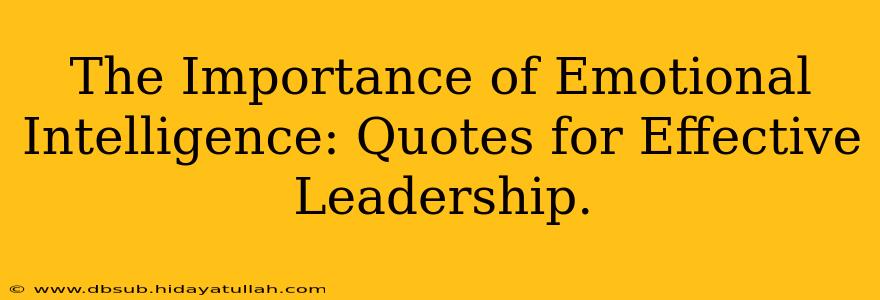Emotional intelligence (EQ) is no longer a "nice-to-have" for leaders; it's a necessity. In today's complex and dynamic world, the ability to understand and manage your own emotions, and those of others, is crucial for building strong teams, fostering collaboration, and achieving organizational goals. While technical skills are important, it's the emotionally intelligent leader who truly inspires and motivates their team to reach their full potential. This article explores the vital role of emotional intelligence in effective leadership, using insightful quotes to illustrate its key components.
What is Emotional Intelligence?
Before delving into the quotes, let's briefly define emotional intelligence. EQ encompasses several key competencies:
- Self-awareness: Understanding your own emotions, strengths, weaknesses, drives, values, and impact on others.
- Self-regulation: Controlling or redirecting disruptive impulses and moods; thinking before acting.
- Motivation: Working with passion and perseverance towards challenging goals.
- Empathy: Understanding the emotional makeup of other people.
- Social skills: Managing relationships, building networks, and finding common ground.
These five components work together to create a leader who is not only competent but also compassionate, understanding, and inspiring. Let's explore this further through the lens of powerful quotes:
"The key is not to prioritize what's on your schedule, but to schedule your priorities." – Stephen Covey
This quote highlights the importance of self-regulation and self-awareness. An emotionally intelligent leader understands their priorities and schedules their time accordingly, ensuring that the most important tasks—those aligned with their values and organizational goals—receive the necessary attention. They don't get bogged down in less important tasks, maintaining a clear focus and demonstrating effective time management.
"Leadership is not about titles, positions, or authority. Leadership is about influence." – Unknown
This emphasizes the significance of social skills and empathy. True leadership isn't about wielding power; it's about inspiring others through influence. Emotionally intelligent leaders understand the needs and motivations of their team members and use their influence to guide, support, and motivate them. They build strong relationships based on trust and mutual respect.
"The best leaders are those who serve others." - Unknown
This quote speaks directly to the essence of empathy and selflessness. Emotionally intelligent leaders are not focused solely on their own advancement; they prioritize the needs of their team and the overall success of the organization. They understand that by empowering and supporting their team, they foster growth and collaboration.
"Emotional intelligence is the ability to sense, understand, and effectively apply the power and acumen of emotions as a source of human energy, information, connection, and influence." – Dr. Reuven Bar-On
This concise definition provided by Dr. Bar-On, a pioneer in the field of emotional intelligence, captures the holistic nature of EQ. It's not simply about understanding emotions, but also about utilizing them effectively to achieve goals and build relationships.
How to Improve Your Emotional Intelligence?
Developing emotional intelligence is a journey, not a destination. Here are some key ways to improve your EQ:
- Practice self-reflection: Regularly assess your emotions and behaviors to understand your strengths and weaknesses.
- Seek feedback: Ask for constructive criticism from trusted colleagues and mentors.
- Develop empathy: Actively listen to others and try to understand their perspectives.
- Practice mindfulness: Be present in the moment and pay attention to your thoughts and feelings.
- Learn from mistakes: Analyze past situations to identify areas where you could have handled things differently.
Conclusion
Emotional intelligence is a crucial skill for effective leadership. By understanding and managing their own emotions and those of others, emotionally intelligent leaders create a positive and productive work environment, foster strong relationships, and achieve organizational success. The quotes discussed above highlight the various facets of EQ and demonstrate its importance in achieving impactful and enduring leadership. Investing in developing your own emotional intelligence will not only benefit you but also those around you, leading to a more fulfilling and successful career.
